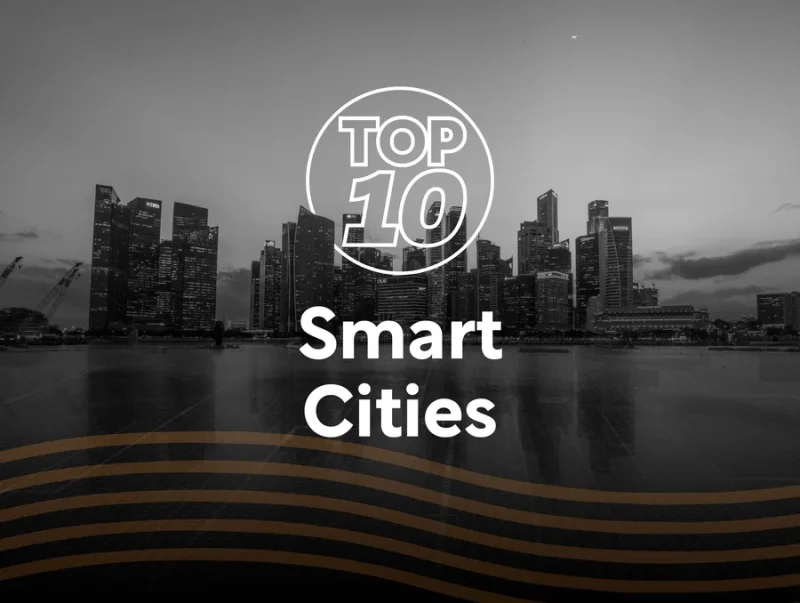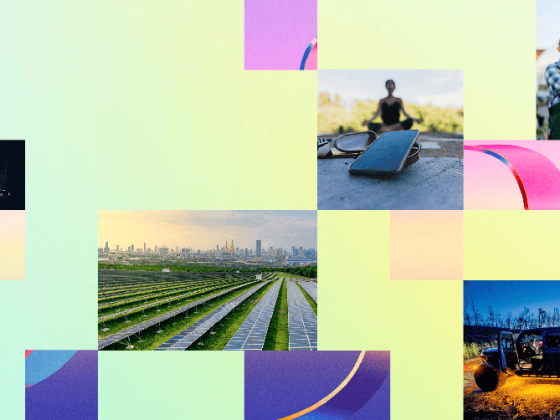This week’s list looks at the most innovative and digitally connected cities in the world
We look at smart cities & the companies responsible for their development, introducing initiatives like waste reduction, energy efficiency & urban mobility
Smart cities represent the cutting edge of urban development, leveraging digital technologies to enhance quality of life, optimise resource management and foster sustainability.
These innovative urban centres employ a network of sensors, data analytics and artificial intelligence to create interconnected systems that improve everything from traffic flow to energy consumption.
The Internet of Things (IoT) forms the backbone of many of these cities, enabling real-time monitoring and responsive urban management.
By 2024, the smart cities market in North America alone is projected to reach US$14.52bn, with global growth following suit.
However, the journey to fully realised smart cities is ongoing. While many urban areas are implementing smart solutions, we’re still years away from seeing comprehensive, city-wide integration of these technologies, like the Neom projects of Saudi Arabia.
The challenge lies not just in technological implementation but in ensuring these advancements benefit all citizens equitably and sustainably.
10. Barcelona, Spain
Population: 1.6 million
Smart city since: 2011
Key focus: Digital democracy
Major corporate partner: Cisco

Barcelona has transformed itself into a model smart city through its innovative use of IoT sensors and open data initiatives. The city’s smart lighting system adjusts illumination based on pedestrian presence, while its smart parking app guides drivers to available spaces, reducing traffic congestion.
Cisco is playing a big role in the city’s transformation, after choosing Barcelona as the “epicentre of its smart city endeavours”. Cisco’s role includes providing the infrastructure for the connected devices that are beginning to populate the city.
Xavier Massa, Director of Public Sector Sales at Cisco Spain, says: “We see Barcelona as an innovation hub for Europe.”
Looking ahead, there are plans to expand the city’s superblock project, which prioritises pedestrians and cyclists over vehicles in designated areas.
9. Singapore
Population: 5.9 million
Smart city since: 2014
Key focus: Urban mobility
Major corporate partner: ST Engineering

Singapore’s Smart Nation initiative has positioned it as a leader in smart urban solutions. The city-state excels in smart mobility, with its intelligent transport system optimising traffic flow and reducing congestion.
ST Engineering is deeply involved in Singapore’s transformation, particularly with regards to transportation. Its Smart Mobility project is helping to shape Singapore’s metro and road systems for the better.
“Mass transit systems play a pivotal role in helping cities decarbonise, and technological advancements present new opportunities for progress in this area,” says Chew Men Leong, President of Urban Solutions at ST Engineering.
“Through combining leading-edge technologies with our deep engineering capabilities, our Smart Mobility solutions enable transportation agencies and operators to effectively address their evolving mobility challenges sustainably while elevating service standards.”
8. Amsterdam, The Netherlands
Population: 921,402
Smart city since: 2009
Key focus: Energy efficiency
Major corporate partner: Philips

Amsterdam’s smart city strategy focuses on sustainability and citizen engagement. The city’s Smart City Experience Lab allows residents to test and provide feedback on new urban technologies.
Several years ago, the city revealed Klimaatstraat (Climate Street, in English), one street in Amsterdam where sustainability was the number one priority.
Tech giant Philips got involved quickly, helping to introduce smart street lighting which dims and brightens depending on footfall in a bid to conserve energy.
Eventually, the aim is to roll out the same smart city technology across the country.
7. Copenhagen, Denmark
Population: 638,970
Smart city since: 2014
Key focus: Public transport
Major corporate partner: Siemens

Copenhagen aims to become the world’s first carbon-neutral capital by 2025. The city’s district heating system is a model of energy efficiency, using waste heat from power plants to warm homes.
Siemens is taking a supporting role in the city’s goal too, helping to improve Copenhagen’s train system with control technology that allows more trains to travel with the same speed and safety.
Eventually, the aim is to have completely automatic trains, without the need for drivers.
“We are very proud to continue and enhance our successful collaboration with Banedanmark and DSB to position the thriving city of Copenhagen as a model for modern rail infrastructure among European capitals,” says Michael Peter, CEO of Siemens Mobility.
“By implementing our best-in-class signalling technology by 2033, trains will be capable of operating automatically and driverless. This will make the new S-bane the world’s largest automatic urban railway.”
6. Tokyo, Japan
Population: 9.73 million
Smart city since: 2016
Key focus: Disaster resilience
Major corporate partner: Hitachi

Tokyo’s smart city initiatives focus on enhancing urban resilience and efficiency. Hitachi plays a crucial role by providing advanced earthquake early warning systems that detect seismic activity and alert residents promptly.
In the aftermath of the 2011 earthquake and tsunami which shook the country to its core, experts believed that smart cities were going to be an important part of the rebuilding efforts.
“The ‘smart city’ concept is considered to be crucial to Japan’s rebuilding effort. The public and private sectors are increasingly turning their attention towards the smart city as a way of solving the complex problems they face today,” said Seiki Maenosono, Hitachi’s Consulting Managing Director.
5. New York City, USA
Population: 8.26 million
Smart city since: 2013
Key focus: Data-driven governance
Major corporate partner: IBM

New York City’s smart city initiatives leverage big data to improve urban services with IBM leading many projects focused on data analytics and AI integration.
The city’s LinkNYC kiosks provide free Wi-Fi while collecting data on pedestrian flow. Future plans include expanding its network of air quality sensors and implementing more smart building technologies to reduce energy consumption.
“IBM continues to be the leader in the Smarter Cities market, helping transform cities of all sizes,” said Michael J Dixon, General Manager of IBM Smarter Cities.
“Our collaborations range from massive and complex strategic projects, to highly focused initiatives using proven solutions that deliver measurable return on investment.”
4. London, UK
Population: 8.86 million
Smart city since: 2013
Key focus: Open data innovation
Major corporate partner: Arup

London’s smart city strategy emphasises open data and citizen engagement with Arup playing an important role in infrastructure development and planning.
The London Datastore provides free access to more than 700 datasets, fostering innovation and transparency among developers and citizens alike.
Future initiatives include expanding its network of smart streetlights and implementing more IoT solutions for air quality monitoring.
“As our world evolves, becomes more interconnected and new critical challenges emerge, digital resilience has become a need rather than a ‘nice-to-have’,” says Will Cavendish, Global Digital Services Leader at Arup.
“Digital and data has become a vital element of resilient systems, whether it’s energy, transport or security (amongst many others), having the power to both support and compromise city resilience,”
3. Seoul, South Korea
Population: 9.41 million
Smart city since: 2011
Key focus: Digital connectivity
Major corporate partner: Samsung SDS

Seoul has established itself as a global leader in smart city innovation with Samsung SDS focusing on digital connectivity and citizen engagement initiatives.
The city’s extensive public Wi-Fi network covers over 100% of outdoor spaces, ensuring ubiquitous internet access, while Samsung’s intelligent transportation systems optimise traffic flow using AI technology.
In the future, the city’s goal is to expand its use of AI in public services and developing more citizen co-creation platforms for urban innovation.
Part of Samsung’s contribution to Seoul’s transformation is in its new, AI-powered apartment buildings, which include electric vehicle fire response solutions and integrated earthquake-resistance.
“Our goal is to provide a comfortable and safe living environment by applying state-of-the-art AI technology and safety solutions,” said Samsung C&T Vice President Kim Myung-Seok.
2. Dubai, United Arab Emirates
Population: 3.3 million
Smart city since: 2014
Key focus: Artificial intelligence
Major corporate partner: Core42

Dubai’s ambitious smart city strategy aims to make it the “happiest city on Earth” through technological innovation.
Core42 is one of the companies leading the charge on this front, with many of its projects focused on AI applications in sectors including healthcare and transportation.
The city already has driverless taxis, designed to reduce accidents and congestion, and there is plenty more to come.
Wasim Beg, Senior Director of Smart Cities at Core42, says: “Smart cities are beyond what we build; they are thriving ecosystems fuelled by technology, sustainability, and human ingenuity.”
1. Helsinki, Finland
Population: 656,920
Smart city since: 2011
Key focus: Citizen-centric innovation
Major corporate partner: Nokia

Helsinki stands out as a smart city pioneer with its unique focus on citizen-centric innovation supported by Nokia’s advanced telecommunications infrastructure which enhances connectivity throughout the city.
The city’s “Helsinki 3D+” project has created a detailed digital twin allowing for advanced urban planning.
Then, there’s Helsinki’s approach to mobility. Residents and visitors can subscribe to the Whim app, which gives them fixed rate access to all forms of public transport, bikes, scooters and more, all in one seamless platform.
“In a competitive global environment, businesses and residents will be drawn to safer, greener and more data-driven cities,” says Richard Cooper, Global CTO for Smart Cities and the Public Sector at Nokia.
Originally published at: Sustainability Magazine
By: James Darley
Source: zedreviews.com










